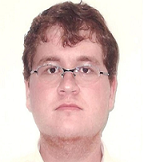Biography
Dr. Bergantin received his academic education at EPM-UNIFESP (Brazil) and UAM (Spain): biomedicine (2008), MSc (2010) and PhD (2014). His research work solved the enigma of the paradoxical effects produced by L-type Ca2+ channel blockers (ScienceDirect TOP 25 Hottest Articles - Biochemistry, Genetics and Molecular Biology - Cell Calcium). Since 1975, several clinical and experimental studies have reported that acute and chronic administration of L-type Ca2+ channel blockers (CCB), such as nifedipine, produces reduction in arterial pressure associated with a paradoxical increase of sympathetic activity. In 2013, Dr. Bergantin and collaborators discovered that this paradoxical increase in sympathetic activity produced by L-type CCB is due to interaction of the Ca2+/cAMP signaling pathways. Then, the pharmacological manipulation of this interaction could be a new therapeutic strategy for increasing neurotransmission in psychiatric disorders, and producing neuroprotection in the neurodegenerative diseases (Bergantin and Caricati-Neto, 2016 Eur J Pharmacol; Caricati-Neto et al., 2015 Pharm Res Perspect). In addition, the pharmacological handling of the Ca2+/cAMP signaling interaction could be a more efficient therapeutic approach to inhibit cancer tumor progression (Errante PR et al., 2017 Adv Cancer Prev). Dr. Bergantin has published several articles in international journals, book chapters and an international book. He is member of several editorial boards of international journals (>50, including editor-in-chief of 3 international journals). Dr. Bergantin has been frequently invited (every week) to be honorable guest (speaker) in international conferences.
Research Interest
His research involves cell signaling mediated by Ca2+ and cAMP, including its role in neuropsychophamacology, autonomic and cardiovascular pharmacology, and cancer.
